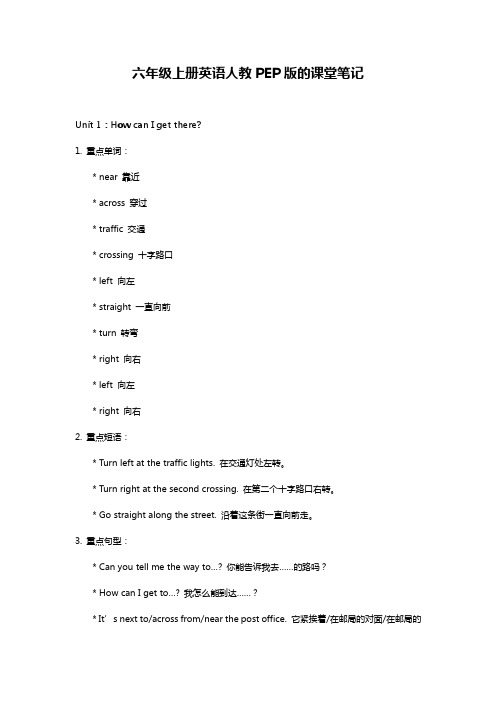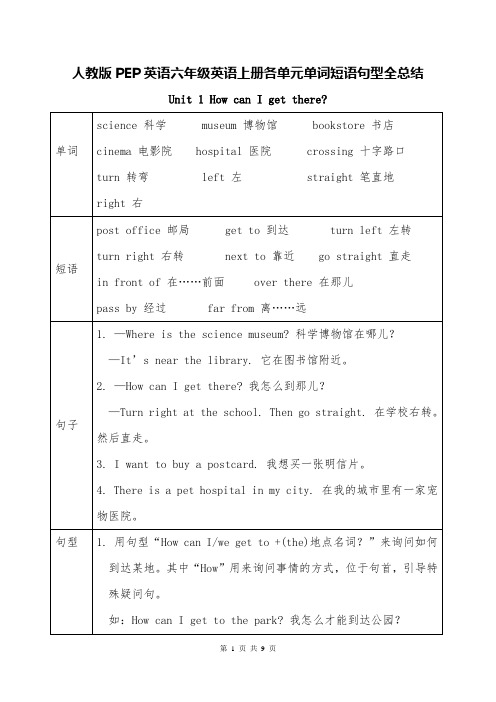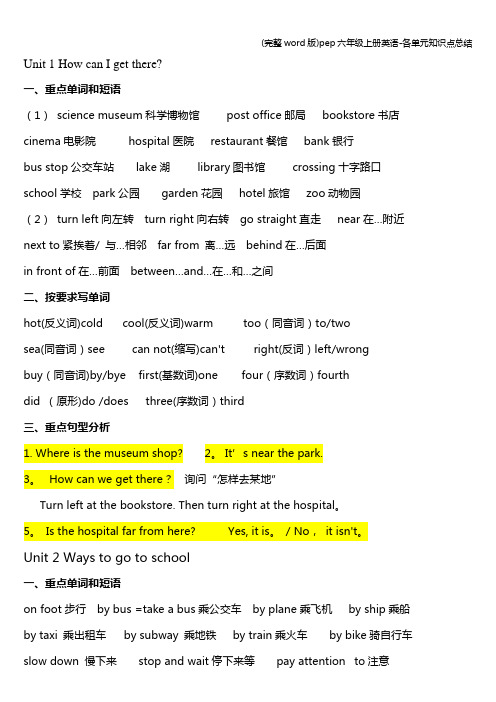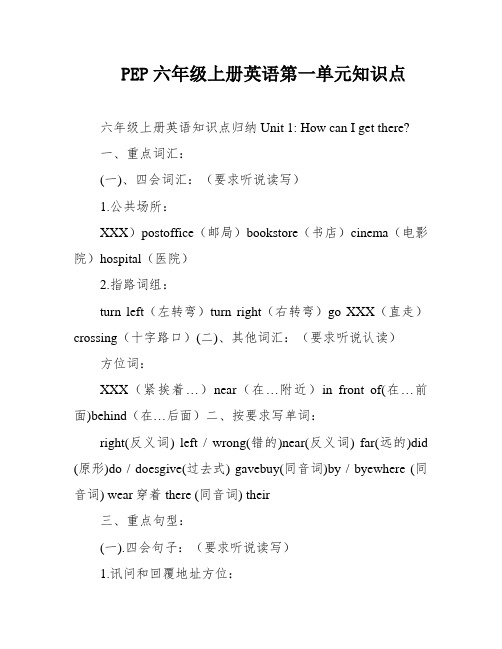PEP六年级上册单词及重点句型
pep六年级上册英语笔记

六年级上册英语人教PEP版的课堂笔记Unit 1:How can I get there?1. 重点单词:* near 靠近* across 穿过* traffic 交通* crossing 十字路口* left 向左* straight 一直向前* turn 转弯* right 向右* left 向左* right 向右2. 重点短语:* Turn left at the traffic lights. 在交通灯处左转。
* Turn right at the second crossing. 在第二个十字路口右转。
* Go straight along the street. 沿着这条街一直向前走。
3. 重点句型:* Can you tell me the way to…? 你能告诉我去……的路吗?* How can I get to…? 我怎么能到达……?* It’s next to/across from/near the post office. 它紧挨着/在邮局的对面/在邮局的附近。
4. 语法知识:* 用“Can you tell me the way to…?”和“How can I get to…?”询问道路和交通方式。
* 用“next to/across from/near”等介词表达位置关系。
5. 功能话题:问路和指路,描述位置关系。
6. 文化知识:了解不同国家的交通规则和交通标志。
Unit 2:Where is the science museum?1. 重点单词:* science museum 科学博物馆* library 图书馆* hospital 医院* cinema 电影院* post office 邮局2. 重点短语:* Excuse me. 对不起。
* Thank you very much/a lot. 非常感谢你。
3. 重点句型:- Excuse me, where is the science museum? 对不起,请问科学博物馆在哪里?- It’s next to/across from/near the post office. 它紧挨着/在邮局的对面/在邮局的附近。
人教版PEP六年级英语上册知识点汇总

人教版PEP六年级英语上册知识点汇总Unit1 How can I get there? 我怎样到达这里?■重点单词:where哪里 how 怎样 can能够 near近的 ask 问 tell 告诉 far远的science科学 hospital 医院museum 博物馆postoffice 邮局 library图书馆bookstore 书店usually通常 sometimes有时候 often 经常 know知道 near旁边next to 旁边(比near更近)crossing 十字路口turn left 向左转turn right 向右转 go straight直走in front of在…的前面behind在...的后面■重点句子:1. How do you go to school? 你是怎样去上学的?2.where is the restaurant? 餐馆在哪里?3. Usually I go to school on foot. 我通常走路去上学。
4. Sometimes I go by bike. 有时候我骑自行车去。
、5. 问路之前,出于礼貌,我们要说“Excuse me”与后面的句子要用标点符号隔开。
6. Look at the traffic lights, remember the trafficrules. 看着交通灯,记住交通规则。
7. Stop at a red light. Wait at a yellow light. Go at agreen light. 红灯停。
黄灯等一等。
绿灯行。
8. Red means stop, yellow means wait, green means go. 红色的意思是停止,黄色的意思是等待,绿色的意思是通行。
9. How can I get to the park? 我该怎样到达公园呢?10. You can go by the No. 15 bus. 你可以坐15路公交车去。
人教版PEP英语六年级英语上册各单元单词短语句型全总结

Unit 3 My weekend plan
单词
visit 拜访 film 电影 trip 旅行
supermarket 超市 evening 晚上;傍晚 tonight 在今晚
tomorrow 明天 dictionary 词典 comic 滑稽的
right 右
短语
post office 邮局 get to 到达 turn left 左转
turn right 右转 next to 靠近 go straight 直走
in front of 在……前面 over there 在那儿
pass by 经过 far from 离……远
句子
1. —Where is the science museum? 科学博物馆在哪儿?
businessman 商人;企业家 fisherman 渔民
scientist 科学家 pilot 飞行员 coach 教练
短语
police officer 警察 factory worker 工厂工人
head teacher 校长 look like 看起来像
lots of 许多;大量的 healthy life 健康的生活
—He works in a car factory. 他在一家汽车工厂工作。
Unit 6 How do you feel?
单词
angry 生气的 afraid 害怕 sad 难过的
worried 担心的;发愁的 happy 高兴的 wear 穿
more 更多的 deep 深的 breath 呼吸 count 数数
PEP六年级上册英语第4单元知识点

Unit 4I have a pen pal一、主要单词:studies学习 (study 单三 ) jasmine 茉莉shall 表示征求意见puzzle 谜idea 想法,主意goal 射门hiking 远足Canberra 堪培拉(澳大利亚join 加入pen pal 笔友首都)club 俱乐部hobby 业余爱好amazing 令人惊奇的share分享二、习惯搭配:read stories读故事climb mountains 爬山live in... 住在··do kung fu 练功夫listen to music 听音乐write an email to... fly kites 放风筝watch TV 看电视给·写电子邮件play the pipa 弹琵琶sing English songs on the playgroundplay sports 唱英文歌在运动场上进行体育活动on a farm 在一个农场里三、重点句型:1.Me too. 我也是。
2.Really? 真的吗?3.Good idea!好主意!4. 询问某人爱好的句型及其答语—— hobby问句: What are sb’s hobbies?...有什么爱好?答语:主语 +like/likes+ 动词-ing形式 (+其它 ). ...喜欢 ...。
动词 ing 表爱好:singing, dancing, reading stories, playing football, doing kung fu, doing word puzzles,going hiking ,watching TV, drawing cartoons, listening to music, going fishing5.询问某人爱好—— like问句: What do/doesyou/ he/she like?答语: I like reading stories and singing.6.由助动词 Do/Does 引出的一般疑问句:(坚持用什么问就用什么答的原则)问句:Do/Does+主语 +动词原形 +其它?答语: (肯定回答 )Yes,主语 +do/does. /(否定回答) No,主语 +don’ t/doesn’t.--Do you/they/ we live in Sydney ?--Yes,I/they/we do.(No,I/ they/ we don’)t.--Does he/she /xxx live in Sydney?--Yes, he/she does.(No, he/shedoesn’) t.--Does he/she/xxx like doing word puzzles and going hiking?--Yes, he/she does.(No, he/shedoesn’) t.7.He lives on a farm,so sometimes he reads to the cows!8.He likes doing kung fu and swimming.9.and 连词,表并列,前后时态一致(和; 与 ; 同; 又 ; 而; 加; 加上 ; 然后 ; 接着 ; )10.“也”: too,alsotoo, also 区别He is a student, too.He is also a student.1、使用场合不同一般说来, also 用于比较正式(formal )的场合,语气比too 庄重; too 是惯熟( familiar )的用语,使用范围较广。
PEP 六年级上册 单词、句型重点

六年级上册句型总揽(U 5 6 三单) 197个单词,一般现在时 + 一般将来时Unit 1 How Do You Go To There? 话题:日常活动(交通)时态:一般现在时句型:1. How 引导的特殊疑问句,围绕人们的出行方式展开交际:--- How do you + 行为活动?--- I + 行为活动 + 出行方式。
例:A: How do you go to school? B: I usually go to school on foot.2. How 引导的特殊疑问句,外出问路:--- How can I get to + 目的地?--- You can go + 交通方式。
例:A: How can I get to Zhongshan park? B: You can go by the No. 15 bus.Unit 2 Where Is the Science Museum? 话题:日常活动(位置交通外出)时态:一般现在时句型:1. Where 引导的特殊疑问句,就建筑物的位置进行问答:--- Where is + 建筑物? --- It's next to + 建筑物。
例:A: Where is the cinema, please? B: It's next to the hospital.2. 祈使句,外出活动。
例: Turn left at the cinema, then go straight.Unit 3 What Are You Going to Do? 话题:日常活动(打算、计划)时态:一般将来时句型:What, Where, When等引导的特殊疑问句,对将要进行的活动等进行问答:--- What are you doing to do + 时间?--- I'm going to + 行为活动。
--- Where / When are you going? --- I'm going + 地点 / 时间。
六年级上册英语重点单词重点句子总复习

PEP六年级上册四会单词及句子复习Unit1第一单元四会单词:Sciencemuseum科学博物馆postoffice邮局bookstore书店cinema电影院hospital医院crossing十字路口turnleft向左转gostraight直走turnright向右转四会句子:1--Whereisthemuseumshop博物馆的商店在哪儿--It`snearthedoor在大门附近2--Howcanwegetthere我们怎么到那儿--Turnleftatthebookstore到书店左转Unit2第二单元四会单词:onfoot走路bybus乘公共汽车bytaxi乘出租车byplane乘飞机bysubway乘地铁byship乘船bytrain乘火车slowdown减速stop停下wait等go走四会句子:1--Howdoyoucometoschool你怎么来学校的--Usually,Icomeonfoot通常我走路来2IntheUSApeopleonbikesmustwearone.在美国骑自行车的人必须戴头盔;3 Don’tgoattheredlight别闯红灯;4Imustpayattentiontothetrafficlights我必须注意交通信号灯Unit3第三单元四会单词:visitmygrandparents拜访我的外祖父母seeafilm看电影takeatrip远行gotothesupermarket去超市dictionary词典comicbook连环画书wordbook单词书postcard明信片四会句子:1--Whatareyougoingtodotomorrow你明天打算做什么--I’mgoingtohaveanartlesson.我要上美术课2 We’regoingtodrawsomepicturesinRenminPark.我要到人民公园去画画3--Whereareyougoing你们打算去哪儿--We`regoingtothecinema我们打算去电影院4Whenareyougoing你们什么时候去Unit4第四单元四会单词:dancing跳舞singing唱歌readingstories看故事书playingfootball踢足球doingkungfu打功夫cooksChinesefood做中国菜studiesChinese学习汉语doeswordpuzzles猜字谜goeshiking远足四会句子:1--WhatarePeter`shobbies彼得有什么爱好--Helikesreadingstories他喜欢读故事2--DoesheliveinSydney他住在悉尼吗--No,hedoesn`t不,他没有3--Doeshelikedoingwordpuzzlesandgoinghiking他喜欢猜字谜和远足吗--Yes,hedoes是的,他喜欢Unit5第五单元四会单词:factoryworker工厂工人postman邮递员businessman生意人policeofficer警察fisherman渔民scientist科学家pilot飞行员coach教练四会句子:1--Whatdoeshedo他是做什么的--Heisabusinessman.他是商人2--Wheredoeshework他在哪儿工作--Heworksatsea.他在海上工作;3--Howdoeshegotowork他怎么上班--Hegoestoworkbybike.他骑自行车上班;Unit6第六单元四会单词:angry生气的afraid害怕的sad悲伤地worried担心的happy开心的seeadoctor看医生domoreexercise做更多的锻炼takeadeepbreath深深吸一口气wearwarmclothes穿暖和的衣服counttoten数到十四会句子:1 They’reafraidofhim.它们害怕它2Thecatisangrywiththem.这只猫生它们的气;3What`swrong怎么了Yourfatherisill.你爸爸生病了;4Heshouldseeadoctorhismorning.他今天早上应该去看病;5Don`tbesad.别伤心PEP六年级上册常用句型问路和指路-Whereis+地点名词……在哪儿-It’s+介词短语.在……;-Howcanwe/Igetto...我们/我怎么到……呢-Turnleft/right./Gostraight./Youcangoby+交通工具.左/右转;直走;/你可以乘坐……去那儿;询问并回答对方来或去某地的交通方式:Howdoyoucome/goto+地点你/你们怎么来/去……I/Wecome/goto+地点+bybike/onfoot….我/我们骑自行车/步行……来/去……询问对方某个时间打算做某事的句型及答语:-Whatareyougoingtodo+表示将来的时间你……打算去做什么-I’mgoingto+动词原形+将来的时间.我打算……去做……询问对方打算去哪儿的句型及答语:Whereareyougoing+表示将来的时间你……打算去哪儿I’mgoingto+表示地点的名词.我打算……去….询问对方打算什么时候去做某事的句型及答语:Whenareyougoing+动词原形你打算什么时候去……Iamgoingto+动词原形+将来时间.我打算……去……;注:begoingto+动词原形=will+动词原形询问别人的爱好并作出回答:Whatis/are某人的hobby/hobbies……有什么爱好=Whatdo/does某人like主语+like/likes+动词-ing+其他.……喜欢做……=某人的hobby is/are….某人的爱好是...;助动词does引导的一般疑问句及答语:Does+第三人称单数主语+动词原形+其他……做……吗-Yes,he/she/itdoes.No,he/she/itdoesn’t.是的,他/她/它是;不,他/她/它不是;询问他人的职业并作出回答:Whatdo/does+主语+do......是做什么的=Whatbe+某人主语+be动词+a/an+职业名词.……是……询问他人的工作地点并作出回答:Wheredo/does+主语+work……在哪儿工作主语+work/works+表示地点的副词或介词短语;……在……工作;询问他人怎么去上班:Howdo/does+主语+gotowork主语+gotowork+bybike/onfoot….询问他人正在做什么及描述正在做某事:What+be+某人+doing主语+be动词+动词-ing+其他….正在…Don’t祈使句:Don’t+动词原形+其他.不要……Don’t+be+形容词+其他.不要……表达对某人或某事的关心:What’wrongwith+某人描述及提问某人的感受的句型:How+do/does某人+feel主语+feel/feels+表示感受的形容词+其他.=主语+be动词+表示感受的形容词+其他.……是……用should来给对方提建议及征求意见的句型:Whatshould某人+do某人should+动词原形.你应该…..语法复习一、现在进行时态3种变化规律1.直接加ing:do—doing draw—drawing cook—cooking answer—answering read—reading listen—listening fly—flying sing—singing play—playing2.去掉末尾的e加ing:write—writing dance—dancing take—taking have—having make—making ride—riding dive—diving3.双写末尾字母加ing:get—getting run—running swim—swimming sit—sitting put—putting你正在干什么WhatareyoudoingI’mansweringthephone.他/她/它正在干什么Whatishe/she/itdoingHe’s/She’s/It’s …他她、它们正在干什么WhataretheydoingTheyare…看到like或likes后面的动词要加上ing二、一般将来时态begoingto/will+动词原形表示一般将来时的时间状语有:thismorning,thisafternoon,thisevening,tomorrow,tonight,thisweekend,ontheweekend,nextweek,nextmonth,nextyear,nextweekend.例:今晚你将要做什么Whatareyougoingtodothisevening—I’mgoingtothecinema.I’mgoingtovisitmygrandparents.你将什么时候去Whenareyougoing—I’mgoingat7:10.你将怎样去呢Howareyougoing—I’mgoingbybus.今天下午你将要去哪里Whereareyougoingthisafternoon—I’mgoingtothebookstore.你将要买什么呢WhatareyougoingtobuyI’mgoingtobuyacomicbook.你将和谁一起去WhoareyougoingwithI’mgoingwithmyparents.三、第三人称单数后面的动词要加s或es1.一般情况加s,如:read—reads;live—lives;play—plays;sing—sings2.动词末尾以s,x,ch,sh或部分以o结尾的加es记住课本中出现的这几个:watches,teaches,goes,does,washes,passes3.辅音字母+y结尾的把y变i再加es,如:fly—flies;study—studies4.特殊情况:have--has5.第三人称单数包括:he;she;it;myfather/friend;Amy/Hangzhou等一个人名或地名;例如:Helikesdrawingpictures.Sheworksinacarcompany.Itcomesfromtheclouds.Myfathergoestoworkonfoot.LiLeioftenplayscomputergamesafterlunch.6.一般疑问句记住:前面助动词加了es,后面动词就不变化了;如:DoessheteachEnglishDoesyourpenpalliveinHangzhou四、不定冠词a和an的用法a用于辅音因素开头的单词前;an用于元音因素开头的单词前;记住课本中出现的要用an的单词:anactor;anactress;anartist;anengineer;anaccountant;anEnglishbook;anorange;anapple;anoldwoman五、动词变化为表示职业或人的单词1.动词后面加er:work—worker;teach—teacher;sing—singer;TV report—TVreporterclean—cleaner2.动词后面加or:act—actor;doctor3.末尾以e结尾的直接加r:write—writer;dance—dancer;drive—driver4.动词后面加ist:art—artist;tour—tourist5.职业男女有区别的:警察policeman—policewoman;演员actor—actress六、8个疑问词which哪一个what什么when什么时候where哪里whose谁的why为什么how怎么样who谁七、人称代词和物主代词I—my-mine我—我的-我的you—your-yours你;你们—你的;你们的-你的;你们的he—his-his他—他的-他的she—her-hers她—她的-她的we—our-ours我们—我们的-我们的they—their-theirs他们/她们/它们—他们的/她们的/它们的他们的/她们的/它们的八、can后面加动词原形WhatcanyoudoIcancookthemeals.Hecanflykites.Shecan playtheviolin.弹小提琴PEP小学英语六年级上册各单元作文一、介绍你和家人上学或上班的方式Igotoschoolonfoot.Mysistergoestoschoolonfoot,too.Mybrothergoestoschoolby bike.Myfathergoestoworkbycar.Mymothergoestoworkbybike.二、看图,说说你怎样去电影院Igotothecinema.Istartfromhere.Gostraightforfiveminutes.Thenturnleftatthe library.Gostraightforoneminute.Thelibraryisontheright.三、读读下周末你和朋友的计划I’mgoingtohaveabusyweekendwithmyfriends.OnSaturdaymorning,wearegoingtog oshpping.OnSaturdayafternoon,wearegoingtothepark.OnSundaymorning,wearego ingtogofishing.OnSundayafternoon,wearegoingtoflykites.Wewillbehappy.四、说说你和你家人的爱好;Ilikeflyingkites.Myfatherlikesdiving.Mymotherlikesplayingthepipa.Mybroth erlikesridingabike.Mysisterlikeslisteningtomusic.MyfriendJohnlikesflying kites.Amylikescollectingstamps.ZhangPenglikesplayingfootball.ChenJielike sridingabike.五、介绍你一家人的职业和上班地点和方式;Myfatherisateacher.Heworksinaschool.Hegoestoworkbycar.Mymotherisanaccoun tant.Sheworksinabank.Shegoestoworkbybus.六、写一封信给你的笔友,介绍你一家人的情况;DearAmy,MynameisSarah.I’m13.I’mtallandthin.Ilikeswimming.Myfatheris40.He’stal landstrong.Helikesreadingbooks.Heisworker.Heworksinafactory.Hegoestowork bycar.M ymotheris39.She’sshortandthin.Shelikescooking.Sheworksinabooksto re.Shegoestoworkonfoot.Yours,Sarah七、看图介绍图中这个人的情况;HeisBen.Heis26.Heisapoliceman.Hegoestowork bybus.Helikesplayingtheviolin.Helikesgoingfishing,too.。
(完整word版)pep六年级上册英语-各单元知识点总结

Unit 1 How can I get there?一、重点单词和短语(1)science museum科学博物馆post office邮局bookstore书店cinema电影院hospital医院restaurant餐馆bank银行bus stop公交车站lake湖library图书馆crossing十字路口school学校park公园garden花园hotel旅馆zoo动物园(2)turn left向左转turn right向右转go straight直走near在…附近next to紧挨着/ 与…相邻far from 离…远behind在…后面in front of在…前面between…and…在…和…之间二、按要求写单词hot(反义词)cold cool(反义词)warm too(同音词)to/twosea(同音词)see can not(缩写)can't right(反词)left/wrongbuy(同音词)by/bye first(基数词)one four(序数词)fourthdid (原形)do /does three(序数词)third三、重点句型分析1. Where is the museum shop? 2。
It’s near the park.3。
How can we get there?询问“怎样去某地”Turn left at the bookstore. Then turn right at the hospital。
5。
Is the hospital far from here? Yes, it is。
/ No,it isn't。
Unit 2 Ways to go to school一、重点单词和短语on foot步行by bus =take a bus乘公交车by plane乘飞机by ship乘船by taxi 乘出租车by subway 乘地铁by train乘火车by bike骑自行车slow down 慢下来stop and wait停下来等pay attention to注意cross the road横穿马路traffic light通信号灯at home在家look right向右看look at朝…看play with和…一起玩二、按要求写单词go (反义词)come foot(复数)feet child(复数)childrenearly(反义词)late good(反义词)bad take(反义词)bringslow(反义词)quick/fast go(过去式)went do(过去式)diddo(第三人称单数) does go(第三人称单数)goessame 相同的(反义词)different不同的miss(过去式)missedwrong 错误(反义词)right正确can(否定形式)can’t三、重点句型分析1。
PEP六年级上册英语第一单元知识点

PEP六年级上册英语第一单元知识点六年级上册英语知识点归纳Unit 1: How can I get there?一、重点词汇:(一)、四会词汇:(要求听说读写)1.公共场所:XXX)postoffice(邮局)bookstore(书店)cinema(电影院)hospital(医院)2.指路词组:turn left(左转弯)turn right(右转弯)go XXX(直走)crossing(十字路口)(二)、其他词汇:(要求听说认读)方位词:XXX(紧挨着…)near(在…附近)in front of(在…前面)behind(在…后面)二、按要求写单词:right(反义词) left / wrong(错的)near(反义词) far(远的)did (原形)do / doesgive(过去式) gavebuy(同音词)by / byewhere (同音词) wear穿着there (同音词) their三、重点句型:(一).四会句子:(要求听说读写)1.讯问和回覆地址方位:--- Where is the XXX的商店在哪?---It’XXX在大门邻近。
2.问路和指路:--- How can we get there?我们怎样到那?--- XXX left XXX到书店左转。
(二).其他句子:(要求听说认读)1. Wu Yifan and Robin are looking at some robots.XXX和XXX正在看一些机器人。
2. I wan to buy a postcard.我想要去买一张明信片。
3. Excuse me, sir.先生打扰一下。
4. What a great museum!多么神奇的博物馆啊!5.It’XXX.它紧挨着书店。
6. There XXX.在我们城市有一个宠物病院。
7. What an interesting film!何等风趣的一部片子啊!8. It’s next to the XXX.在东方街,它紧挨着公园。
- 1、下载文档前请自行甄别文档内容的完整性,平台不提供额外的编辑、内容补充、找答案等附加服务。
- 2、"仅部分预览"的文档,不可在线预览部分如存在完整性等问题,可反馈申请退款(可完整预览的文档不适用该条件!)。
- 3、如文档侵犯您的权益,请联系客服反馈,我们会尽快为您处理(人工客服工作时间:9:00-18:30)。
PEP六年级上册四会单词及重点句型英语
Unit 1
by (经,乘) foot(脚) bike(自行车) bus(公共汽车) train(火车) how(怎样) go to school(上学)traffic(交通)traffic light(交通灯)traffic rule(交通规则)stop(停,停车站)wait(等待)
get to(到达)
Unit 2
library(图书馆) post office(邮局) hospital(医院) cinema(电影院) turn(转弯) bookstore(书店) where(在哪里,到哪里) please(请) next to(与…相邻) right (右边) left(左边) straight(成直线地) then (然后) Unit 3
next week(下周) this morning(今天上午) this afternoon(今天下午) this evening (今天晚上) comic book(漫画书) post card(明信片) newspaper(报纸) buy(购买)
Unit 4
hobby(爱好) ride a bike--riding a bike(骑自行车) dive--diving(跳水) each--teaches(教) play the violin—playing the violin(拉小提琴) make kites—making kites(制作风筝)
collect stamps—collecting stamps(集邮) live –lives(居住) go--goes(去)
watch--watches(看) read--reads(读,看) does doesn’t=does not
Unit 5
singer(歌唱家,歌手) writer(作家) actor(男演员) actress(女演员) artist(画家)
TV reporter(电视台记者) engineer(工程师) accountant(会计) policeman(男警察) salesperson(销售员) cleaner(清洁工) where(在哪里,到哪里)work(工作)
Unit 6
rain(雨) cloud (云) sun(太阳) stream(河,溪) come from(来自,从…来) seed(种子)
soil(土壤) sprout (苗,芽) plant(植物,种植) should (应该) then(然后)
重点句子
How do you go to school, Sarah? 你怎么去学校,莎拉?
Usually I go to school on foot. Sometimes I go by bike. 通常我不行去学校,有时我骑自行车去。
How can I get to Zhongshan Park? Y ou can go by the No.15 bus.
我怎样才能去中山公园呢?你可以乘15路公共汽车去。
Where is the cinema, please? It’s next to the hospital.请问电影院在哪里?它在医院旁边
Turn left at the cinema, then go straight. It’s on the left.在电影院向左转然后直走,它在左边。
What are you going to do on the weekend? 这个周末你准备做什么?
I’m going to visit my grandparents this weeke nd. 我准备去拜访我的(外)祖父母这个周末。
Where are you going this afternoon? I’m going to the bookstore.这个下午你准备去哪?我准备去书店。
What are you going to buy? I am going to buy a comic book. 你准备去买什么?我要买一本漫画书What’s your hobby? I like collecting stamps. 你的爱好是什么?我喜欢集邮
He likes collecting stamps, too. 他也喜欢集邮
Does she teach English? No, she doesn’t. 她教英语吗?不,她不是
Does she teach your math? Yes, she does. 她教你的数学吗?是的
What does your mother do? She is a TV reporter. 你的妈妈是做什么的?她是电视台记者
Where does she work? She works in a school. 她在哪里工作?她在学校工作
How does she go to work? She goes to work by bus. 她怎么去工作的?她坐公共汽车去上班Where does the rain come from? It comes from the clouds. 雨来自哪里?它来自云
How do you do that? 你怎么做那件事?
What should you do then? 然后你怎么做?。
